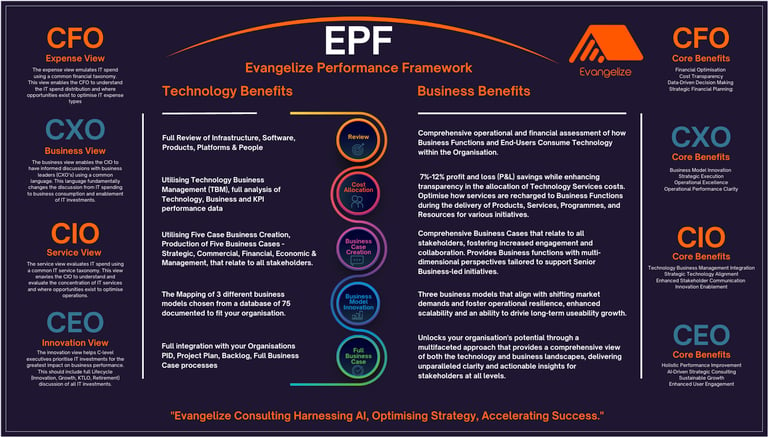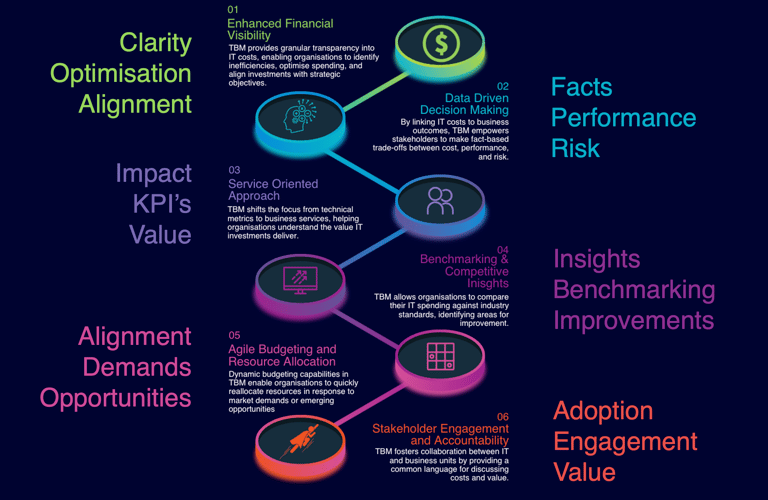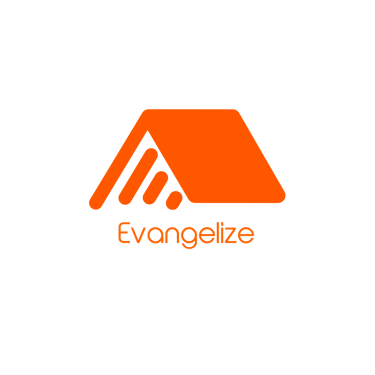
The Evangelize Performance Framework (EPF)
Evangelize’s proprietary, AI-enabled framework for strategic cost reduction, operational excellence, and business–technology alignment.
A Strategic Transformation Blueprint
Review - Establish a profound, multi-dimensional diagnostic baseline of the organisation's current state, covering technology, processes, costs, strategic alignment, and operational capabilities. This is considered the bedrock of the entire EPF engagement.
What Is EPF ?
EPF combines Technology Business Management (TBM), Business Model Innovation (BMI), and the Five Case Model into a structured five-stage methodology. It empowers leadership teams to transform digital spend into measurable, sustainable value.


The Six Stages of EPF ?
Assess - Transform the baseline data into evidence-based insights and meticulously quantified opportunities, leveraging deep analytical rigour and advanced Technology Business Management (TBM) application.
Design - Architect a clear, compelling, and adaptable strategic roadmap for transformation, co-designing future state architectures, defining robust initiatives, and building super-detailed, evidence-based Five Case Model business cases.
Engage - Develop and dynamically execute a comprehensive strategy to inspire understanding, build unwavering commitment, and mobilise the entire organisation behind the architectural design of future-state operations
Orchestrate the precise execution of the transformation roadmap, leveraging advanced analytics and AI where appropriate, dynamically managing performance, proactively mitigating risks, and driving maximal benefit
Integrate - Ensure the deep and sustainable integration of all EPF-driven advancements into the user's standard organisational operating model, systematically leveraging ITIL 4 principles and practices.


Why Clients Choose Evangelize
A Performance Framework that captures both the Technology and Business Landscape
Why Analyse Your Resourcing Requirements with EPF ?
By integrating Technology Business Management (TBM) principles, the EPF provides granular visibility into IT expenditure patterns, service-level economics, and resource utilisation, enabling data-driven prioritisation of investments and fostering stronger IT-business partnerships.
Workforce Intelligence is a data-driven consulting service aimed at helping organisations optimise their human resources for maximum efficiency and strategic value. Offered as a branded solution by Evangelize Consulting, it is designed for recruitment agencies to deploy with their clients as a value-added service. The goal is to analyse a client’s resourcing capabilities (their workforce structure, skills, and processes) and identify inefficiencies or gaps. By leveraging advanced analytics and Evangelize’s proprietary methodology, the service provides actionable insights that enhance workforce performance and drive strategic decision-making
EPF links every role to cost, performance, and strategic value — so you know exactly who’s driving impact and where to optimise.
Savings - 7–12% P&L savings (20%+ in complex programmes)
Integrate - Enable structured, strategic alignment between technology investments and enterprise business objectives, with all decisions guided by Technology Business Management (TBM) discipline.
Integrate - Ensure the deep and sustainable integration of all EPF-driven advancements into the user's standard organisational operating model, systematically leveraging ITIL 4 principles and practices.
Integrate - Ensure the deep and sustainable integration of all EPF-driven advancements into the user's standard organisational operating model, systematically leveraging ITIL 4 principles and practices.
Integrate - Ensure the deep and sustainable integration of all EPF-driven advancements into the user's standard organisational operating model, systematically leveraging ITIL 4 principles and practices.
Integrate - Ensure the deep and sustainable integration of all EPF-driven advancements into the user's standard organisational operating model, systematically leveraging ITIL 4 principles and practices.
Integrate - Ensure the deep and sustainable integration of all EPF-driven advancements into the user's standard organisational operating model, systematically leveraging ITIL 4 principles and practices.
Integrate - Ensure the deep and sustainable integration of all EPF-driven advancements into the user's standard organisational operating model, systematically leveraging ITIL 4 principles and practices.
Integrate - Ensure the deep and sustainable integration of all EPF-driven advancements into the user's standard organisational operating model, systematically leveraging ITIL 4 principles and practices.
Integrate - Ensure the deep and sustainable integration of all EPF-driven advancements into the user's standard organisational operating model, systematically leveraging ITIL 4 principles and practices.
Delivery Models
One of the strengths of the Workforce Intelligence offering is its flexibility.
Evangelize Consulting has designed it to work in multiple engagement models to fit different needs:
One-Off Consulting Engagement?
In this format, Workforce Intelligence operates as a project-based consultancy service. The recruitment agency and Evangelize Consulting partner to deliver a comprehensive diagnostic of the client’s workforce. Over a focused period, the team gathers data, performs analysis, and produces a detailed report with recommendations. This one-time engagement is ideal when a client needs a point-in-time assessment – for example, before a major restructuring or as part of an annual strategic review. It culminates in an in-depth Workforce Intelligence Report and executive presentation, but does not necessarily include ongoing monitoring after the project.
Subscription-Based Intelligence Product: Here, Workforce Intelligence becomes an ongoing service – essentially a subscription that continuously tracks workforce metrics and provides periodic insights. The recruitment agency can offer this as a monthly or quarterly “workforce health check”, where Evangelize’s analytics platform ingests updated HR data and refreshes key metrics/KPIs. Subscribers receive regular reports or dashboard access to see trends (e.g. utilization rates, turnover, skill gaps) and progress on past recommendations. This model supports continuous improvement: it’s not just a one-off report, but a “living” intelligence product that flags new issues and opportunities in real time. Recruitment consultants can use these insights to have ongoing strategic conversations with the client’s leadership. Over time, the data can also be benchmarked against industry trends or peer companies, giving the client context on how their workforce efficiency compares externally.
In all of these models, commercial flexibility is key. Evangelize Consulting supports a 50/50 fee-share model between the recruitment agency and the client. This means the cost (and by extension, the value or ROI) of the service is shared evenly, aligning both parties’ interests. For example, the recruitment agency might co-sell the service to the client and split the fees: this incentivizes the agency to champion the service (since they share in the revenue) while making it more affordable for the client (since their cost is effectively halved). The fee-share approach fosters a partnership dynamic – both the agency and client are invested in the success of the engagement. It also underscores that Workforce Intelligence brings benefit to both sides: the agency gains a new consulting revenue stream and deeper client relationship, and the client gains significant cost savings and performance improvements from the insights.
Embedded Capability (Advisory Integration): In this model, Workforce Intelligence is woven into a broader advisory or managed service offering. Instead of a standalone project, the capability is embedded within the client’s operations or the agency’s broader consulting program. Evangelize Consulting might help set up a Workforce Intelligence function or toolset inside the client organisation (or within the recruitment agency itself), training internal staff to use the EPF 3.1 approach for ongoing workforce planning. This could involve installing dashboards, algorithms, or frameworks that the client’s HR or strategy team can use continuously. Often, this is part of a larger transformation engagement – for example, if the client hires the recruitment agency for overall workforce strategy or HR transformation, the Workforce Intelligence component provides the analytical engine and methodology within that. The embedded approach ensures the client builds internal capability for workforce analytics, with Evangelize/agency experts guiding at first and gradually handing over the reins. It creates a sustainable practice rather than a one-time insight, and can be tailored across sectors or business units.
Subscription Based Intelligence Product
Embedded Capability
Commercial Flexibility

Contact Us for Business Transformation
Get in touch to start your transformation journey today.


